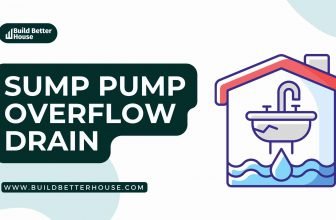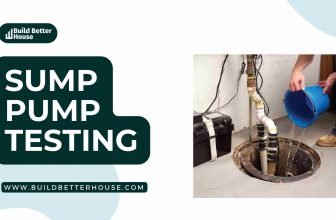How To Deodorize Sump Pump? This Is What I Do

Have you ever noticed a strange smell from the basement sump pump? Sump pump odors can be pungent and unpleasant, and they can make the entire basement smell musty. A buildup of sediment, oil, grime, and other contaminants could cause it. So, you need to learn how to deodorize sump pump.
Deodorizing your sump pump can help improve the air quality in your home and prevent odors from permeating the house. It can also reduce the chance of bacteria and mold growth.
Fortunately, there are several easy ways to deodorize your sump pump and keep your basement smelling fresh. From baking soda to installing a carbon filter, these simple steps will help eliminate any unpleasant odors and keep your sump pump running smoothly. In this article, I will explain the steps on how to deodorize sump pump and keep it working properly.
How To Deodorize Sump Pump: What Does A Sump Pump Smell Like

The foul odors that sump pump systems emit can make your basement smell terrible and keep you away from the space. Here are some more common odors and bad scents that you might detect.
Sewer Gas
When sewage seeps into a house from a sewer line breach or sewage infiltration, it can result in sewage smells and raw sewage. The scent resembles gasoline but is sewer gas. The sump pump dries out and leaks sewer gas into the house. This gas comes from waste and contains nontoxic gases.
Mold And Mildew
A sump pump smells like mildew and mold when water accumulates, and mildew and mold grow in it. It will help if you strive to maintain the sump pump as dry as possible without interfering with the device’s performance to avoid foul odors.
Rotten Eggs
Sump pumps may produce a foul odor due to dirt buildup. It may be the source of the rotten eggs smell, which requires you to deodorize the sump pump.
Waste
Waste is the leading cause of sump pump malfunctions. The sump pump picks up waste materials daily, and they slowly accumulate. These accumulations can lead to clogs that cause sump pumps to stink. Sometimes, it only requires cleaning and maintenance with a bleach solution and scrub brush.
Ignoring your sump pump’s stink can become problematic for you in the future. You must deodorize the sump pump if it smells like any of the ones mentioned above.
How To Deodorize Sump Pump: Common Issues That Cause Sump Pump Odors
Before you look at some solutions for how to deodorize sump pump, let’s look at the common issues that cause sump pump odors. Here are some of the primary reasons for a sump pump that smells bad:
Sewage Infiltration
Raw sewage can infiltrate the groundwater near a sewer line, leak, or break if a sump basin collects excess groundwater when a sewer line breaks or seeps, excess sewage can leak into the sump basin, causing noticeable sump pump odors in your home.
As time passes, these odors become more and more apparent, suggesting an issue with the sump pump. Sewer line problems that cause sewage odors require you to deodorize sump pumps and call an urgent plumbing service.
A plumbing technician takes advantage of a camera to scrutinize the sewer lines of a house and determine the spot of breakage or tear. Then, carry out the essential repairs to obstruct the penetration of sewage into the nearby groundwater and your sump pit.
Stagnant Basin
A sump pump drains water accumulating in a basin using the Boat switch. If the sump pump fails to activate, stagnant water in the basin leads to sump pump smells. A sump pump malfunctioning due to a defective check valve may also result in persistent water in the sump pit.
When the pump stops pumping, water that the sump pump previously pumped out of the basin bows back in, causing sump pump odors. All these situations require you to deodorize the sump pump immediately.
Dry Sump Basin
The sump pit must always contain a small amount of water. The sump pit will dry during dry periods, and water evaporates. When the basin dries out, it releases gases, which cause bad smells in your home.
If the basin is dry, refill it with enough fresh water to cover the drain lines that run out of the pit or deodorize the sump pump using the below-mentioned techniques.
Basement Drainage
When a basement bathroom or laundry room is present, greywater may be routed through the sump basin to drain. Detergent and soap residue may accumulate in the sump pit, resulting in odors.
Maintaining your sump pump and the sump pit through regular cleanings helps prevent unpleasant odors.
You can eliminate odors by regularly cleaning your sump pump and pit. Or you can deodorize a sump pump using the below-mentioned tips.
How To Deodorize Sump Pump: 8 Best Ways To Solve The Issue
Let’s discuss some solutions for how to deodorize the sump pump. Maintaining your sump pump is essential to avoid problems, and you may need to deodorize the sump pump or seek professional help if it smells like sewage or other foul substances.
Sump pump odors often indicate that something is wrong with the system, so it’s critical to maintain your equipment. The following are some of the best ways to address these common causes and deodorize sump pumps.
1. Use A Basin Cover
I suggest an airtight sump pit cover. This cover is the best way to deodorize a sump pump, as it prevents smells from seeping. Reducing airflow reduces the number of scents that can infiltrate your residence. Airtight covers are the best option but if you can’t find one with a perfect fit, strive for a tight seal.
2. Disinfect With Bleach
Chemicals and other junk that gets into your basement from the ground settles inside your pump over time, leading to a foul odor. You can use hot water and bleach to clean your basin and the sump pump. This is an excellent way to kill bacteria that causes odors and keep your system clean and healthy.
I suggest using diluted bleach to clean the entire system at least once a year to eliminate bacteria and germs. Scrub the basin and pump with a sponge and diluted bleach to eliminate bacteria that cause odors and deodorize the sump pump.
3. Keep Water Covering The Drain
Even though sump pump pits usually contain some standing water, the water should be kept high enough to cover the drain hole so that smells in the pipe remain there. As long as the water is clean and does not begin to smell, you should be able to control a lot of smells from entering your sump pump pit.
The suction of the pump keeps smells from seeping into your home while it is active. It can also deodorize sump pumps and prevent sewer odors from entering your basement.
4. Clean With Vinegar
Cleaning a sump pump pit with vinegar may sound surprising, but it eliminates nasty odors like rotten eggs and excrement. Begin with a sponge and a bucket of hot water, then pour a large quantity of vinegar.
Scrub the pit and the sump pump exterior thoroughly with vinegar. Clean everything thoroughly after you’ve finished preventing rust and corrosion. Add some liquid dish soap for more cleaning power, if desired.
5. Clean The Drain Lines
A drain line is a dark, damp location ideal for growing mold, mildew, and other odors. In addition, the lines are much harder to clean than the pump, so they are probably only cleaned once a year.
You can eliminate various problems, including mold and mildew by using a hose to blast hot water at the lines. You might add a few drops of bleach and a little soap to the water, then turn the water on high for a few minutes to deodorize the sump pump.
6. Remove Standing Water
When water remains in the sink without reaching the switch-on level of the float switch, it can often lead to foul odors. If the water has not been removed from the pit, it will bring a variety of bad smells into the basement.
7. Clean The Impeller
It is essential to ensure that no type of garbage accumulates in the sump pit of your house. If there is congestion in the pit, it can create bad smells, eventually spreading throughout the residence.
Particles can pass through the filter of a sump pump and block the impeller. To determine if this is the issue, first turn off the pump, disconnect the piping and remove the equipment from the pit.
You can take the pump apart to get to the filter and impeller. Make sure to clear away any obstructions, reassemble the pump, and put it back into place.
8. Check For Sewage Issues
If a broken or damaged sewage line is close to your house’s base, it can lead to contaminated water seeping into the ground. When the polluted liquid makes its way into the sump pit, an unpleasant odor of sewage usually becomes noticeable.
If you detect any unpleasant smells, it is vital to have a certified plumber investigate the system, determine the source of the sewage problem, and take care of it immediately.
All the methods mentioned above help you how to deodorize sump pump.
FAQs (Frequently Asked Questions) On How To Deodorize Sump Pump
Why does my sump pump stink?
When sump pumps are used for extended periods, they become depleted. During a dry season or drought, the sewer gas that accumulates in the reservoir can enter the home because the water typically serves as a barrier and is no longer present. In the most advantageous situation, this just results in an unpleasant smell.
How do you disinfect a sump pump?
You can disinfect a sump pump by following the below steps:
Remove the sump pump from the pit
Soak with a vinegar-water solution
Rinse with hot water
Clean the drainage pipe
Put the sump pump back and turn it on
Run a cycle with clean water (This is optional)
Can I pour vinegar into my sump pump?
An optimal way to clean a sump pump is to combine equal parts of water and vinegar. Then, use a garden hose to respray the pump.
Why does the sump pump smell like sewer?
If water from your sewer line enters your sump pump, it may be contaminated with waste materials, resulting in a foul odor. You can fix your sewer line and clean or swap out your sump pump to eliminate this sulfurous stench in your home.
Summary: How To Deodorize Sump Pump
Sump pumps remove water from a sump basin and return it to the soil through an underground channel called a pipe. When the pump fails to function correctly, the sump basin fills with stagnant water and creates a breeding ground for bacteria, eventually leading to foul odors.
While there are many different types of sump pumps and methods on how to deodorize sump pumps, the best way to deodorize a sump pump is by keeping your pump clean and circulating it regularly to remove any dirt or debris accumulated in the system.
If you find a foul odor coming from your sump pump, try some of the abovementioned techniques. If the issue persists, call a plumbing or electrician for assistance.
I hope this article on how to deodorize sump pump sounds helpful!






